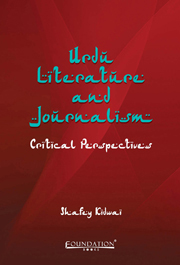Book contents
- Frontmatter
- Dedication
- Contents
- Preface
- Introduction
- Acknowledgements
- 1 Post-Independence Urdu Short Story
- 2 Post-Partition Urdu Poetry
- 3 Structuralism and Post-structuralism in Urdu Criticism
- 4 Jayant Parmar
- 5 Firaq as a Critic
- 6 Ghalib Criticism
- 7 Literature, Culture and Social Consciousness
- 8 The Influence of Tagore on Urdu Literature
- 9 Early Journalistic Endeavours of Sir Syed Ahmad Khan
- 10 Pioneering the First Urdu Book on Journalism
- 11 The Contribution of Urdu Journalists to the First War of Independence
- 12 Abul Kalam Azad's Journalistic Conquests
- Index
12 - Abul Kalam Azad's Journalistic Conquests
Published online by Cambridge University Press: 05 October 2014
- Frontmatter
- Dedication
- Contents
- Preface
- Introduction
- Acknowledgements
- 1 Post-Independence Urdu Short Story
- 2 Post-Partition Urdu Poetry
- 3 Structuralism and Post-structuralism in Urdu Criticism
- 4 Jayant Parmar
- 5 Firaq as a Critic
- 6 Ghalib Criticism
- 7 Literature, Culture and Social Consciousness
- 8 The Influence of Tagore on Urdu Literature
- 9 Early Journalistic Endeavours of Sir Syed Ahmad Khan
- 10 Pioneering the First Urdu Book on Journalism
- 11 The Contribution of Urdu Journalists to the First War of Independence
- 12 Abul Kalam Azad's Journalistic Conquests
- Index
Summary
Journalism, since its inception, has been perceived as the most effective agent of social activation, and no other social and intellectual activity can vie with journalism in propelling forward the process of social change. This is the reason that a number of political leaders, educationists, social reformists and ideologues of the pre-independence era such as Raja Ram Mohan Roy, Sir Syed Ahmad Khan, Pandit Madan Mohan Malviya, Lala Lajpat Rai, Mahatma Gandhi, Maulana Mohammad Ali and Zafar Ali Khan had started their periodicals, not for literary excellence or for carving out a niche for themselves in the power structure, but for moulding public opinion against the foreign rule. There is no denying the fact that their efforts bore fruits but their missionary zeal and rhetorical and polemical writings were not fully compatible with the epistemological and professional framework of journalism.
Much has been written about Maulana Abul Kalam Azad's political statesmanship, unrivalled erudition and unequal intellectual eloquence in proffering a perceptive and innovative discussion on the topics having definite bearing on the metaphysical and physical aspects of life.
His journalistic excellence, the hallmark of his creative genius, has also come in for detailed debate. It has been pointed out, time and again, that Azad's lucid but verbose prose style unfailingly charted a new path in Urdu journalism.
- Type
- Chapter
- Information
- Urdu Literature and JournalismCritical Perspectives, pp. 167 - 175Publisher: Foundation BooksPrint publication year: 2014



